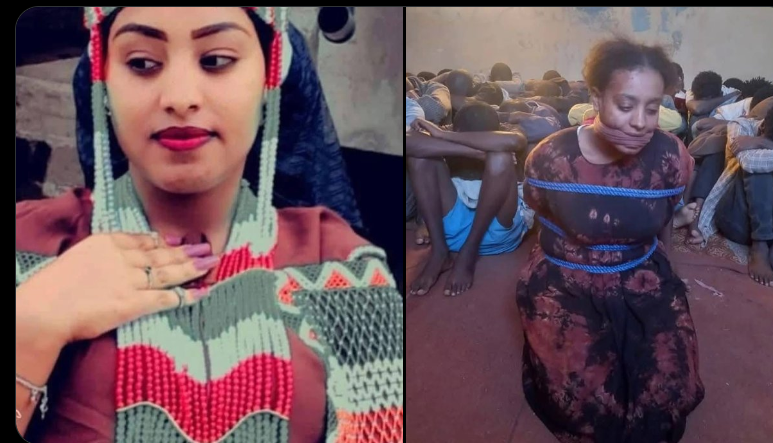
In a harrowing incident that has drawn international condemnation, Naima Jamal, a 20-year-old Ethiopian woman, has been kidnapped and subjected to brutal torture by human traffickers in Kufra, Libya. This shocking case highlights the ongoing crisis of human trafficking in the region and the urgent need for global awareness and intervention.
The Abduction
Naima Jamal was abducted shortly after her arrival in Libya in May 2024, as she sought to escape poverty and pursue a better life in Europe. Tragically, she fell victim to a trafficking group that preys on vulnerable individuals seeking a way out of their circumstances. Along with her boyfriend, Naima was taken captive and has since been held for ransom, with her captors demanding $6,000 for her release.
The Torture
Recent videos sent to Naima’s family have surfaced on social media, revealing the horrific conditions she is enduring. In the footage, Naima is seen tied up inside a toilet, crying out in agony as water is poured over her and she is beaten with sticks. Her hands are bound to the ceiling, rendering her helpless as she pleads for mercy.
These distressing images serve as a stark reminder of the brutality faced by many victims of human trafficking in Libya.
The traffickers have not only subjected Naima to physical violence but have also shared images of over 50 other victims, further illustrating the scale of this tragic situation. Many of these individuals are shown bound and awaiting auction in what can only be described as a modern-day slave market.
The Human Trafficking Crisis in Libya
Libya has become a notorious hub for human trafficking, where individuals from Sub-Saharan Africa are often lured by false promises of better opportunities only to find themselves trapped in a cycle of abuse and exploitation. According to reports, thousands arrive in Libya each year with hopes of crossing into Europe but instead fall prey to ruthless traffickers who exploit their desperation.
David Yambio, founder of Refugees in Libya, emphasized the dire situation faced by families like Naima’s. He noted that demanding such an exorbitant ransom from impoverished families is an unimaginable burden. The fear instilled by traffickers often prevents families from seeking help or sharing information about their loved ones’ captivity.
Naima Jamal is among dozens of victims of Libya’s modern slave trade. Naima Jamal, a 20-year-old Ethiopian woman from Oromia, was abducted shortly after her arrival in Libya in May 2024. Since then, her family has been subjected to enormous demands from human traffickers, their calls laden with threats and cruelty, their ransom demands rise and shift with each passing week. The latest demand: $6,000 for her release. This morning, the traffickers sent a video of Naima being tortured.
The footage, which her family received with horror, shows the unimaginable brutality of Libya’s trafficking networks. Naima is not alone. In another image sent alongside the video, over 50 other victims can be seen, their bodies and spirits shackled, awaiting to be auctioned like commodities in a market that has no place in humanity but thrives in Libya, a nation where the echoes of its ancient slave trade still roar loud and unbroken. “This is the reality of Libya today,” writes activist and survivor David Yambio in response to this atrocity.
“It is not enough to call it chaotic or lawless; that would be too kind. Libya is a machine built to grind Black bodies into dust. The auctions today carry the same cold calculations as those centuries ago: a man reduced to the strength of his arms, a woman to the curve of her back, a child to the potential of their years.” Naima’s present situation is one of many. Libya has become a graveyard for Black migrants, a place where the dehumanization of Blackness is neither hidden nor condemned.
Traffickers operate openly, fueled by impunity and the complicity of systems that turn a blind eye to this horror. And the world, Yambio reminds us, looks the other way: “Libya is Europe’s shadow, the unspoken truth of its migration policy—a hell constructed by Arab racism and fueled by European indifference.
They call it border control, but it is cruelty dressed in bureaucracy.” The $6,000 ransom demanded for Naima is not just a price for her life; it is a price for the silence of a global community that allows this horror to happen to the black child. And yet, for many, this is not survival, it is a cycle of endless suffering. Naima’s fate, and that of the 50 other victims in Kufra, remains uncertain. Their cries are met with indifference by those who could intervene but choose not to. Meanwhile, their families are left to battle with the impossible, raising the funds demanded by traffickers or risking the loss of their loved ones forever.
The world must confront the uncomfortable truth: the slave trade is alive and thriving in Libya. It thrives in the silence of nations, in the shadows of complicit systems, and in the unchecked racism that dehumanizes Black lives. Naima’s story, as Yambio writes, is not an anomaly, it is the legacy of a history that refuses to end.
The Call for Action
The plight of Naima Jamal underscores the urgent need for collective action against human trafficking. Advocacy groups and human rights organizations are calling for increased awareness and intervention from governments and international bodies to combat this heinous crime. Immediate measures are necessary to rescue victims like Naima and restore their dignity and freedom.







